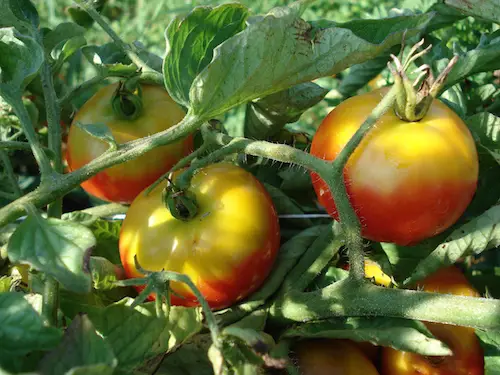Help! My Tomatoes Have Green Shoulders (or Yellow Shoulders)
Since 2010, Tomato Dirt has garnered 4.8+ million views, making it the web’s leading online source for growing tomatoes in the home garden. Award-winning writer and Tomato Dirt owner Kathy Widenhouse has helped thousands of home gardeners grow healthier tomatoes. Be one of them when you get Tomato Dirt’s Growing Guide here.
Updated 6.22.25
Some tomatoes develop green shoulders (or yellow shoulders), even when the rest of the fruit ripens. It’s annoying because you want the whole tomato, obviously, to be red and tasty.
The phenomenon is not caused by a pest or a disease, but is directly related to the weather. The good news is that once you understand why tomato tops go rogue, you can take steps to prevent it from happening.
Why tomatoes develop green shoulders
There are a couple of reasons that tops of tomatoes stay green or yellow while the rest of the fruit ripens. The first has to do with lycopene production. Lycopene is a plant pigment which gives tomatoes their red color.
The ideal temperature for lycopene development is 65-75º F. When temperatures rise above 75ºF and stay sustained, lycopene production is inhibited.
The irony is that tomatoes like heat. Plants tolerate higher temperatures than 75ºF consistently throughout the summer. But it’s the fruit’s exposure to the direct sun that dictates what happens on its shoulders. The upper portions of tomatoes generally receive the most exposure to heat or sunlight. As sun strikes tops of tomatoes, temperatures in the fruit rise, inhibiting lycopene. Without precautions, those portions cannot produce lycopene. They stay green.
Another reason tops of tomatoes may stay green has to do with chlorophyll, the pigment that gives plants green color. Excessive heat prevents chlorophyll from breaking down. So when ripening green tomatoes are in the direct, hot sun for hours on end, chlorophyll hangs on. Put together chlorophyll’s stubbornness with lycopene’s inhibition issues, and green reigns where red is meant to break through on tomato tops.
Why tomatoes develop yellow shoulders
Carotene, another pigment in tomatoes, produces yellow and orange. It is less affected by heat. When higher temps and hot sun strike tomato tops, carotene (yellow) shines through while lycopene (red) is squelched. The lower part of the tomato is often protected from direct exposure by the top of the fruit. Thus your tomatoes' shoulders can remain yellow while the rest of the tomato ripens to red.
Bottom line when it comes to tomato shoulders
When temperatures are high and stay that way, exposed tomato shoulders may not ripen evenly along with the rest of the fruit. Pigments are the culprit. If the variety’s carotene makeup is on the low side, then the fruit will likely exhibit green shoulders. Higher carotene content means the tomato shoulders will be yellow. Chlorophyll throws a monkey wrench in the whole mix.
But the problem is not insolvable! No, you cannot control the weather. But when you protect tomato plants from excessive direct sun, you can allow them to ripen evenly.
How to prevent green shoulders and yellow shoulders in tomatoes
- Maintain good leaf cover if possible. Plant more densely and prune less.
- Shade plants in the afternoons when temperatures are especially hot and fruit is ripening.
- Some tomato varieties have inherited more of a tendency to green or yellow shoulders than others. Choose varieties that are less apt to be slow-ripening on their tops.
Other details to know about green shoulders and yellow shoulders in tomatoes
- Some tomato varieties (like Cherokee Purple) are expected to have green shoulders. But most varieties are not wired to do so. Check details about your variety before planting so you know what to expect.
- Heirloom tomatoes are more prone to green or yellow shoulders than hybrids, due to breeding.
- Tomatoes with green or yellow tops are still edible. Simply cut out the parts that are not red.
More problems on tomato fruit
What causes mealy tomatoes and what to do about it ...
6 Kinds of Tomato Plant Leaf Curl and How to Treat Them ...
Tomato anthracnose: how to identify and treat it ...
How to identify, treat, and prevent problems on tomato fruit ...
Why is there a hard core in tomato centers?
Why a tomato cracks and what to do about it ...
Tomato sunscald: too much sun can be hazardous to tomato health ...
Gray wall on tomatoes: blotchy ripening on fruit ...
Blossom end rot: how to identify, treat, and prevent it ...
Get more tips on our Tomato Problems Pinterest board...
Return from Green Shoulders on Tomatoes to Tomato Dirt home
As an Amazon Associate and Rakuten Advertising affiliate I earn from qualifying purchases.
SHARE THIS PAGE:
FREE! 10 Must-Know Tomato Growing Tips: 20-page guide
Get yours here:




